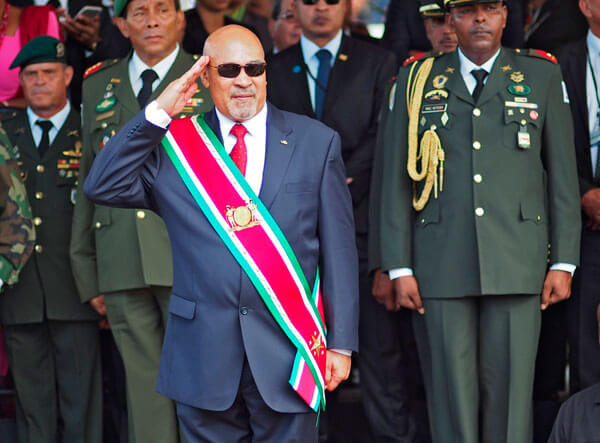While the Caribbean trading group nation of Suriname celebrated its 40th independence anniversary from The Netherlands on Wednesday, Nov. 25 there are fears of political disquiet in the country after authorities quietly devalued the local dollar.
The move by the Central Bank has put a damper on celebrations but officials said the adjustment was necessary to realign the economy in the wake of very weak international prices for gold and oil — two of the country’s main economic pillars — as well as to cater for a bauxite industry that has been struggling for years.
“Suriname is momentarily experiencing a genuine commodity shock,” the bank said in a statement that appears to have caught civil society and opposition parties off guard, at least in the hours after the announcement.
People are angry in the Dutch-speaking republic that is across the bordering Corentyne River from Guyana because they think that the devaluation was done by stealth as it was only confirmed by the bank a week ago when in fact the currency had in real terms been experiencing a defacto weakening for several months.
The Suriname Dollar or SRD which had replaced the local Guilder about a decade ago, is now trading officially at US $4-1 and at $425-1 on the black market, considered to be larger than the official economy.
It has been devalued by just over 20 percent, sending up prices for consumer products. Rumors about the announcement also pushed thousands to petrol filling stations to capitalize on prices before owners adjusted them.
Trying to assuage the opposition and locals in general, the bank explained that national foreign exchange reserves had declined spectacularly from US$1B to about $370M thanks largely to soft prices for oil and gold and the pullout of Pennsylvania-based world bauxite giant ALCOA from Suriname.
The country of 480,000 people like Trinidad is an oil producer, having found black gold on land while drilling water wells in the 70s. Offshore drilling in recent decades has been unsuccessful but is continuing.
The country also has a large Canadian-owned gold mine west of Paramaribo, the capital, along with a huge brigade of small and medium scale miners but the industry has taken a battering in recent months.
“We are heading straight for a fiasco in this country,” said Ronnie Brunswijk, a Maroon opposition leader in the southeast. The money printing machine is now running at full speed. With the increase of light and water, it is now doubly hard for poor people. The government needs balance. The government boat is sinking,” said Brunswijk. “If the captain does not change course, the country falls into a deep valley.”
Two other opposition parties, the Hindustani VHP and the Creole-supported National Party of Suriname have reacted differently to the latest developments, with the VHP blaming President Desi Bouterse’s policies for the state of the economy while the NPS says his administration which was reelected in late May should be given a honeymoon period to adjust.
Bouterse’s National Democratic Party won a majority of the 51 seats at the elections, the right to form a government while legislators and district representatives voted to elect him president for a second five-year term.
He is most famous for staging the February 1980 military coup that toppled the elected government and for being convicted by the Dutch for alleged drug trafficking.
























